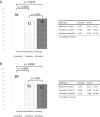Proactive Drug Monitoring Is Associated With Higher Persistence to Infliximab and Adalimumab Treatment and Lower Healthcare Utilization Compared With Reactive and Clinical Monitoring
- PMID: 32743546
- PMCID: PMC7380488
- DOI: 10.1093/crocol/otaa050
Proactive Drug Monitoring Is Associated With Higher Persistence to Infliximab and Adalimumab Treatment and Lower Healthcare Utilization Compared With Reactive and Clinical Monitoring
Abstract
Background: Serum drug-level assays for infliximab (IFX) and adalimumab (ADA) are widely available and are most often obtained reactively, to determine the next steps in patients with loss of response. Studies done thus far on the use of these assays proactively, or during symptom remission, have had mixed results. Here we investigate persistence on therapy and healthcare utilization in patients on 3 drug-level monitoring strategies.
Methods: We conducted a retrospective chart review of 235 patients treated for both Crohn disease and ulcerative colitis on either IFX or ADA. Monitoring strategy was defined as proactive if patients underwent testing at predefined time points regardless of symptoms or signs of disease, reactive if done during relapse, or control if no drug levels were obtained. Groups were compared on persistence on original therapeutic at 1 and 2 years as well as on various measures of healthcare utilization during the 2-year follow-up period.
Results: Proactive drug monitoring was associated with a higher likelihood of persistence on therapy at 1 year when compared with the control (odds ratio [OR] = 4.76, 95% confidence interval [CI] = 1.65, 13.67) and reactive groups (OR = 6.10, CI = 2.19, 17.02). Similarly, at 2 years, proactive monitoring was superior to the control (OR = 5.41, CI = 2.26, 12.94) and reactive groups (OR = 4.51, CI = 1.88, 10.80). Proactive monitoring was also associated with lower healthcare utilization across almost all measures related to inflammatory bowel disease.
Conclusions: Proactive drug monitoring increases persistence on IFX and ADA in patients with ulcerative colitis or Crohn disease and decreases overall healthcare utilization in these patients.
Keywords: adalimumab; infliximab; therapeutic drug monitoring.
© 2020 Crohn’s & Colitis Foundation. Published by Oxford University Press on behalf of Crohn's & Colitis Foundation.
Figures

References
-
- Colombel JF, Sandborn WJ, Rutgeerts P, et al. . Adalimumab for maintenance of clinical response and remission in patients with Crohn’s disease: the CHARM trial. Gastroenterology. 2007;132:52–65. - PubMed
-
- Hanauer SB, Feagan BG, Lichtenstein GR, et al. ; ACCENT I Study Group . Maintenance infliximab for Crohn’s disease: the ACCENT I randomised trial. Lancet. 2002;359:1541–1549. - PubMed
-
- Ben-Horin S, Chowers Y. Review article: loss of response to anti-TNF treatments in Crohn’s disease. Aliment Pharmacol Ther. 2011;33:987–995. - PubMed
-
- Yanai H, Hanauer SB. Assessing response and loss of response to biological therapies in IBD. Am J Gastroenterol. 2011;106:685–698. - PubMed
-
- Adedokun OJ, Sandborn WJ, Feagan BG, et al. . Association between serum concentration of infliximab and efficacy in adult patients with ulcerative colitis. Gastroenterology. 2014;147:1296–1307.e5. - PubMed
Grants and funding
LinkOut - more resources
Full Text Sources
Research Materials
